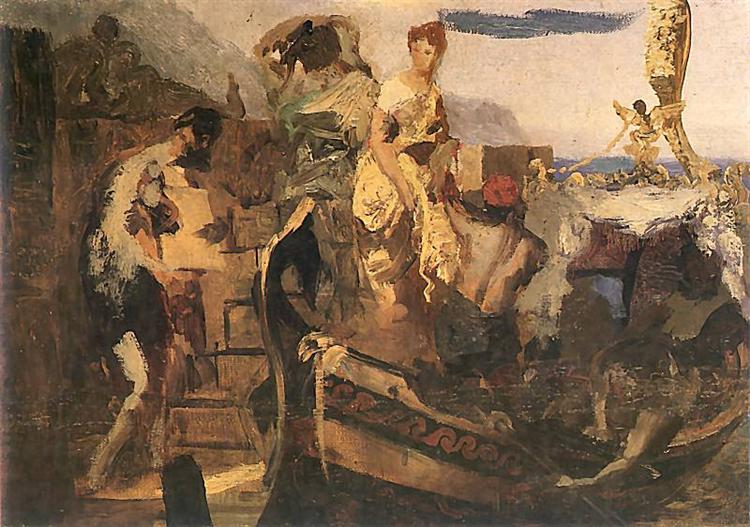Description
Henryk Siemiradzki, an outstanding Polish painter of the nineteenth and early twentieth centuries, is known for his works that fuse the classical tradition with a rich pictorial technique. His painting "beggar (sketch)" of 1902, although less famous than other works of his, encapsulates his domain in emotional representation and delicacy of details. In this sketch, Siemiradzki introduces us to a deeply resonant social reality, showing a beggar in a position that expresses both vulnerability and dignity.
The composition of the work is both direct and powerful. The beggar is in the foreground, occupying the center of the painting. Its facial expression, although austere, transports a world of unfrusty stories. The folds of their clothing, painted with meticulous attention, suggest a life of suffering and deprivations, while transmitting the technical skill of Siemiradzki. Through his brush, he manages to remember the character's humanity, beyond his social condition. This approach in the detail of the garments, which seem almost touch, reveals the depth of the artist's study on the human figure and its context.
The use of color in the "beggar" is equally remarkable. Siemiradzki uses terrible and dark tones that evoke deterioration and sadness, contrasting with subtle more luminous nuances that highlight the skin of the beggar. The chosen palette not only establishes a melancholic climate, but also facilitates an emotional connection with the viewer. The light is managed with subtlety, selectively illuminating the characteristics of the protagonist, which directs attention to his face and the hands that hold a container, possibly in search of alms.
Although "beggar (sketch)" is a preliminary work, its technical perfection suggests that Siemiradzki dedicated considerable energy and reflection to its execution. This sketch is a proof of the painter's artistic process, who had already demonstrated his ability to create masters during his career. His style is characterized by a romanticism that is often intertwined with severe realisms, creating a dialogue between aesthetic beauty and social criticism. This balance is perceived not only in this specific piece, but in all its production, which covers mythological, historical and contemporary issues.
Siemiradzki's relationship with his native country, Poland, and his personal history, which includes his training in prestigious art academies and his experience in Rome, also permeate his work of influences and contexts that enrich each piece. Although "beggar (sketch)" may not be one of his most famous works, it serves as a reminder of the ability of art to address urgent social problems and the technical mastery of Siemiradzki to carry out such visions.
The sketch, modestly titled, not only reflects the condition of the representative individual, but invites the viewer to meditate on the nature of poverty in a world that often chooses to ignore it. Through this work, Seimiradzki continues its legacy as an artist who manages to capture the essence of the human being, urging reflection on the inequalities present in our society. Ultimately, "beggar (sketch)" is not just a study by a marginal character; It is a powerful reminder of the dignity that resides in each individual, regardless of their position in the social fabric.
KUADROS ©, a famous paint on your wall.
Hand-made oil painting reproductions, with the quality of professional artists and the distinctive seal of KUADROS ©.
Art reproduction service with satisfaction guarantee. If you are not completely satisfied with the replica of your painting, we refund your money 100%.

